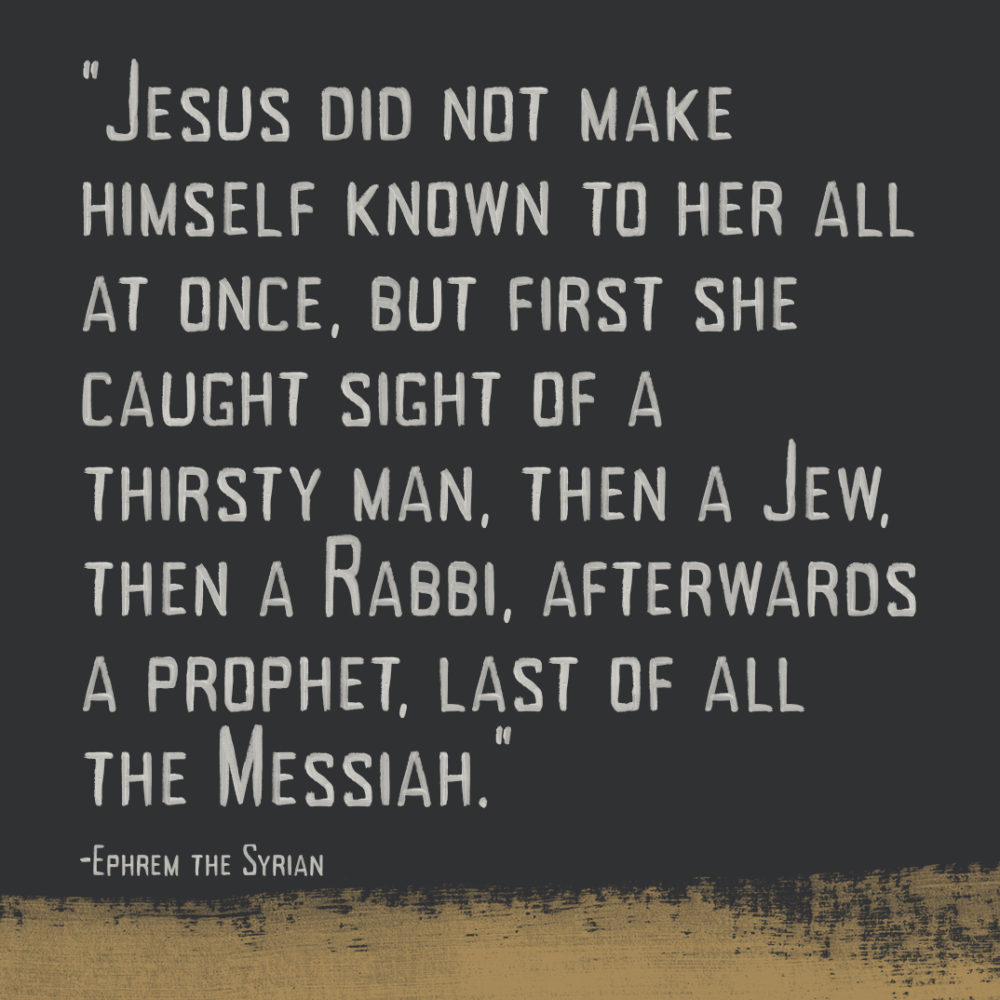It was about noon. 7When a Samaritan woman came to draw water, Jesus said to her, “Will you give me a drink?” 8 (His disciples had gone into the town to buy food.)
9 The Samaritan woman said to him, “You are a Jew and I am a Samaritan woman. How can you ask me for a drink?” (For Jews do not associate with Samaritans.)
10 Jesus answered her, “If you knew the gift of God and who it is that asks you for a drink, you would have asked him and he would have given you living water.”
John 4:6b-10
The Lonely Woman
The women of the village drew their water early in the morning and just before sundown to avoid the heat of the day. For protection and propriety, they came to the well together. But this Samaritan woman came to the well of Jacob alone at noon.
She’d been married five times before and was now staying with a man who wasn’t her husband. Is this the reason she came alone at midday? Did she avoid the other women in the village out of shame or had they shunned her out of judgement?
A Thirsty Man
The man sitting by Jacob’s well hadn’t brought a bucket of his own. Any Jew who drank after a Samaritan would become unclean. But this man asked to drink from a Samaritan’s bowl.
A Jewish Rabbi
The most pious rabbis wouldn’t speak to a woman in public – not even to their mothers, wives, or daughters. Jews had a long tradition of educating women, but by the time of Jesus Jewish attitudes toward women had become markedly more Greco-Roman. One rabbi had declared, “Let the words of Torah burn rather than be transmitted to women.” But this rabbi taught the Samaritan woman Torah and much more.
A Wise Prophet
“If you knew the gift of God and who it is that asks you for a drink, ” he said, “you would have asked him and he would have given you living water.”
To a Samaritan, the “gift of God” was the Torah. But Jesus claimed to somehow be those words in the flesh.
“Everyone who drinks this water will be thirsty again,” he explained, “but whoever drinks the water I give them will never thirst. Indeed, the water I give them will become in them a spring of water welling up to eternal life.”
“Sir,” the woman said, “I can see that you are a prophet” (John 4:19).
The Messiah
The Samaritans weren’t waiting for a Messiah who would restore Israel and rule over her like King David. They waited for a Messiah called the Taheb – a prophet like Moses who would teach them all things (Deuteronomy 18:15-18).
“I know that Messiah is coming, “she said. “When he comes, he will explain everything to us.”
And Jesus answered, “I, the one speaking to you—I AM” (John 4:25, 26)
The kingdom of Heaven came slowly to this woman: As a thirsty man, a Jewish rabbi, a wise prophet, the Messiah and the Savior of the world. And then the kingdom spread quickly.
Many of the Samaritans from that town believed in him because of the woman’s testimony, “He told me everything I ever did.” 40 So when the Samaritans came to him, they urged him to stay with them, and he stayed two days. 41 And because of his words many more became believers.
42 They said to the woman, “We no longer believe just because of what you said; now we have heard for ourselves, and we know that this man really is the Savior of the world.”
John 4:39-42

Reflection
• How have you experienced God this Lenten season and how has it changed you?
Our Prayer
LORD, we know you have visited us and we haven’t recognized you. You have spoken to us and we haven’t heard.
Open our eyes and ears.
Messiah, visit us today as a stranger in need, a teacher who instructs, a prophet who tells us the truth about ourselves, and as our Savior and the Savior of the whole world.
Amen.
 Shaun Groves
Shaun Groves